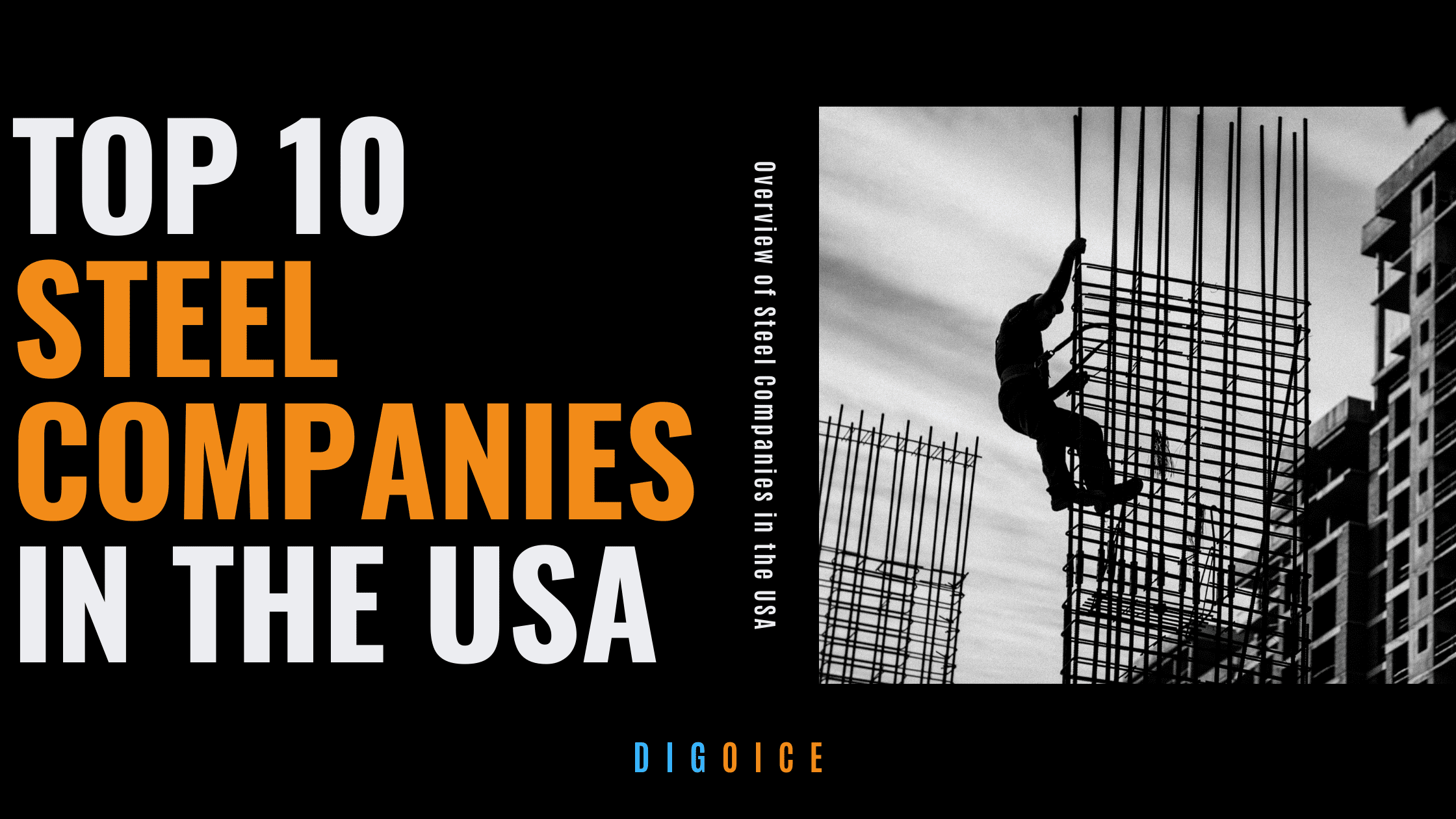Steel, often referred to as the backbone of modern civilization, plays a pivotal role in various industries, from construction to automotive manufacturing. In the United States, the steel industry has a rich history marked by innovation, challenges, and resilience. This blog the top 10 steel companies in the USA providing a detail overview of their historical evolution, current landscape and key players, technological advancements, challenges faced, and future outlook.
Brief Overview of the Steel Companies in the USA
The United States steel industry has been a driving force in the nation’s economic development for over a century. With roots tracing back to the 19th century, the industry experienced exponential growth during the industrial revolution, powering the construction of railways, bridges, and skyscrapers. Over time, the US steel sector has adapted to changing economic landscapes, international competition, and technological advancements.
Historical Perspective
The evolution of the steel industry in the USA is a narrative woven with tales of innovation and adaptation. In the late 19th and early 20th centuries, steel magnates like Andrew Carnegie and John D. Rockefeller played crucial roles in shaping the industry. The advent of the Bessemer process, a revolutionary method for mass-producing steel, further fueled the industry’s growth.
The mid-20th century witnessed the rise of integrated steel mills, consolidating various stages of steel production under one roof. However, the latter part of the century saw a decline in the industry due to global competition, labor issues, and a shift towards more specialized steel products.
Current Landscape
In the 21st century, the US steel industry has undergone significant transformations. Despite facing challenges such as overcapacity, trade disputes, and the rise of alternative materials, the sector remains a vital contributor to the country’s economy. The emergence of electric arc furnaces (EAF) and mini-mills has brought about a new wave of efficiency and sustainability, challenging the dominance of traditional integrated mills.
Overview of Steel Companies in the USA
- Nucor Corporation
- United States Steel Corporation
- ArcelorMittal USA
- AK Steel (now part of Cleveland-Cliffs)
- Steel Dynamics, Inc.
- Commercial Metals Company
- Gerdau Ameristeel (now Gerdau)
- California Steel Industries
- NLMK USA
- TMK Ipsco
Key Players
Nucor Corporation, often regarded as a pioneer in the mini-mill concept, stands out as a leader in the US steel industry. Known for its innovative approaches and commitment to sustainability, Nucor has consistently ranked among the top steel producers.
United States Steel Corporation, with a history dating back to the late 19th century, has been a stalwart in the industry. The company’s integrated approach to steel production, from raw materials to finished products, reflects its historical significance and continued relevance.
ArcelorMittal USA, a subsidiary of the global giant ArcelorMittal, holds a prominent position in the US steel market. The company’s international reach and diverse product portfolio contribute to its strength in the competitive landscape.
In-depth Analysis of Leading Steel Manufacturers
Nucor Corporation’s success lies in its decentralized structure, fostering innovation and adaptability. The company’s use of EAF technology minimizes waste and energy consumption, aligning with the growing emphasis on sustainability in the industry.
United States Steel Corporation, with its integrated production facilities, boasts a comprehensive approach to steel manufacturing. The company’s recent investments in technology and infrastructure aim to enhance efficiency and competitiveness.
ArcelorMittal USA leverages its global presence and expertise to offer a wide range of steel products. The company’s commitment to research and development ensures it stays at the forefront of technological advancements in the industry.
Technological Advancements
The steel industry is undergoing a technological revolution, with advancements shaping its future trajectory. Automation, artificial intelligence, and data analytics are becoming integral to steel manufacturing processes, improving efficiency, reducing costs, and minimizing environmental impact.
Mini-mills, utilizing EAF technology, have gained prominence for their flexibility and lower environmental footprint compared to traditional integrated mills. These mini-mills recycle scrap steel, reducing the demand for raw materials and energy consumption.
Challenges of Steel Companies in the USA
Despite its resilience, the US steel industry faces several challenges. Overcapacity, largely fueled by global competition, has led to pricing pressures and reduced profit margins for many steel companies. Trade disputes and tariffs further complicate the industry’s landscape, impacting international partnerships and market access.
Environmental concerns also pose challenges. While technological advancements have improved efficiency and reduced emissions, the industry faces increasing scrutiny regarding its environmental impact. Striking a balance between production demands and sustainability remains a key challenge for steel companies.
Future Outlook of Steel Companies
The future of the US steel industry hinges on its ability to adapt to evolving trends and challenges. As the world transitions towards a more sustainable future, steel companies are under increasing pressure to embrace green practices and invest in cleaner technologies. The growing demand for electric vehicles, renewable energy infrastructure, and eco-friendly construction materials presents new opportunities for innovation and growth in the steel sector.
Trends and Projections for the US Steel Market
- Sustainable Practices: Steel companies are expected to prioritize sustainability, adopting cleaner production methods and reducing their carbon footprint.
- Technological Integration: Continued investments in automation, artificial intelligence, and data analytics will drive efficiency and competitiveness in the industry.
- Shift towards Specialty Steels: The demand for high-performance and specialty steels in industries such as aerospace, automotive, and energy is expected to rise, presenting lucrative opportunities for steel manufacturers.
- Global Collaboration: As the industry becomes increasingly interconnected, collaborations and partnerships between US steel companies and their international counterparts will become more common.
- Resilience against Trade Turbulence: Steel companies will need to navigate global trade dynamics, adapting to changes in tariffs and trade agreements to maintain a competitive edge.
Conclusion
The US steel industry, with its storied history and ability to adapt to changing landscapes, remains a cornerstone of the nation’s economy. The top 10 steel companies in the USA, driven by innovation, sustainability, and technological advancements, continue to shape the industry’s future. As the world transitions towards a greener and more connected future, the steel giants must navigate challenges, embrace opportunities, and contribute to a sustainable and resilient steel industry.






